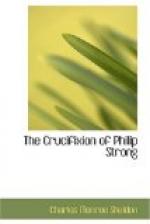He had been in the habit of going out to Communion Sunday with the emblems of Christ to observe the rite by the bedsides of the aged or ill, or those who could not get out to church. He carried with him this time a basket containing a part of the communion service. After going to the homes of one or two invalid church-members, he thought of the person who had been mentioned by the man in the morning as living in the tenement district and in a critical condition. He had secured his address, and after a little inquiry he soon found himself in a part of the tenements near to him.
He climbed up three flights of stairs and knocked at the door. It was opened by the sexton. He greeted Philip with glad surprise.
The minister smiled sadly.
“So, my brother, it is true you are serving your Master here? My heart is grieved at the action of the church this morning.”
“Don’t say anything, Mr. Strong. You did all you could. But you are just in time to see him.” The sexton pointed into a small back room. “He is going fast. I didn’t suppose he was so near. I would have asked you to come, but I didn’t think he was failing so.”
Philip followed the sexton into the room. The son of the old slave-master was sinking rapidly. He was conscious, however, and at Philip’s quiet question concerning his peace with God, a smile passed over his face and he moved his lips. Philip understood him. A sudden thought occurred to Philip. He opened the basket, took out the bread and wine, set them on the small table, and said:
“Disciple of Jesus, would you like to partake of the blessed communion once more before you see the King in His glory?”
The gleam of satisfaction in the man’s eyes told Philip enough. The sexton said in a low voice: “He belonged to the Southern Episcopal Church in Virginia.” Something in the wistful look of the sexton gave Philip an inspiration for what followed.




